MASS CONSUMPTION: THE END OF AN ERA?
On Friday 24th April 2020, Fashion Revolution hosted our sixth annual Fashion Question Time, a powerful platform to debate the future of the fashion industry during Fashion Revolution Week. In light of current COVID-19 measures, Fashion Question Time was hosted in a new digital format.
This year’s theme, “Mass consumption: The end of an era?”, couldn’t feel more relevant to the present situation. Our current crisis has sparked a renewed desire to support each other in a time of uncertainty and is highlighting ways in which our personal habits can become more sustainable. We have been encouraging an end to overconsumption for many years, yet we also know that in the face of this unexpected halt in manufacturing, it is the most vulnerable, lowest paid people in the fashion supply chain that feel the worst effects. So, as we take this time to pause and reflect on our own consumption and disposal patterns, the question of how to support the millions of supply chain workers who have already lost their jobs remains largely unanswered.
MEET THE PANEL
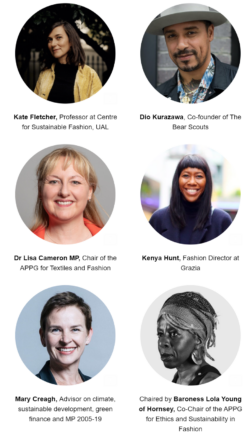
MISSED THE EVENT? WATCH FASHION QUESTION TIME AGAIN HERE:
Below we have selected some questions and answers that were discussed over the debate during Fashion Question Time 2020:
An opening speech was made by Carry Somers, co-founder and Global Operations Director of Fashion Revolution, speaking of her recent voyage in the Pacific researching microplastics, she said:
And there in the middle of the ocean, I confronted the signs and symbols of our consumption, across the pacific seascape. I witnessed the reflection of our age of excess in the surface of the sea, in the trail of plastic waste which has been left in the wake of uncontrolled growth. So our challenge this decade is to move beyond our currently destructive and western world view which is tipping us into a climate catastrophe and a plastic pollution crisis, towards a fashion industry that integrates nature in a truly sustainable way.
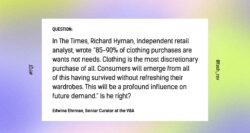
The first question was submitted by Edwina Ehrman, Senior Curator at the V&A, focussed on how clothing demand may change post-COVID.
Kenya Hunt, Fashion Director, Grazia:
We’re already seeing a change in demand and I think that largely boils down to the economy which is in a state of free fall. I read that 75% of consumers in Europe and the States, believe that their personal finances are being negatively impacted by this pandemic. So that alone is, it is impacting demand. On top of that, we were seeing a gradual shift and mindset with consumers in general as awareness spreads of how overconsumption has a negative toll on the planet.
Mary Creagh, Advisor on climate, sustainable development, green finance and MP 2005-19:
I think there’s a radical change coming – we’ve seen collapses in sales. I’m sure China is seeing a boom but that’s because nobody’s bought anything that for three months. So what happens when the sort of pent up demand, the people who want those handbags or want those top items? What happens when they stopped buying those things? They’ve got what they want. What’s clear is there’s a collapse in sales, an absolute collapse.
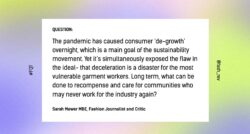
The following question by Sarah Mower MBE explored current reduction in growth and its impacts on garment workers.
Kate Fletcher, Centre for Sustainable Fashion, UAL:
De-growth is not the same as negative growth. And what we’re experiencing at the moment is negative growth. And I think it’s really wholly wrong to assume that what is happening now in the fashion sector in any way gives us a full taste of what will happen if we engage with de-growth ideas fully. So what growth is, is it’s the process of accumulation of capital and wealth. Whereas de-growth by contrast, it’s not an economic concept wholly. It really involves the whole of society. It asks questions about values and representations and it’s about examining consumption of natural resources and energy but within the carrying capacity of the planet.
Dr Lisa Cameron MP and Chair of the APPG for Textiles and Fashion:
There are massive global issues to consider in terms of appropriate wages for those workers internationally and how we’ll attempt to support them in when they are in poverty. There are also issues for the UK in terms of the fashion industry to take forward, which have been thrown into this conversation and we’re looking at trying to address some of those. That might be something that that moves forward progressively as a result [of this pandemic].
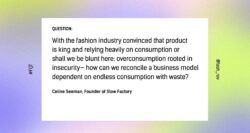
Celine Seeman, Founder of Slow Factory, submitted a thought-provoking question on how we can reconcile the current business model dependent on consumption.
Dio Kurazawa, Cofounder, The Bear Scouts:
This is about capitalism. And I think it’s very key to note that she said that this is rooted in insecurity. Yes. that’s correct. We don’t need to buy all the things that we do buy. But these businesses have been set up in order to perpetuate overconsumption. I think the real answer to this is really innovation. It’s about how things are made. Are they adopting circular methods? The other thing is that brands don’t look at their supply chain as partners. A lot of my manufacturing clients have been left in the dark by Arcadia group, for example, who’s left one of my manufacturers with a bill of around 400,000 pounds in cancelled orders.
Kate Fletcher, Centre for Sustainable Fashion, UAL:
The fashion industry has been set up to make us spend money we don’t have on things we don’t need to impress people we don’t much care about. And so as we’re going forward, it is important for us to, to recognize that the business model that underpins the current fashion sector is based on a logic of economic growth. Other logics and other business models are available. It’s not the only world, we created this and we can create something else. We need business as part of a solution moving forward.
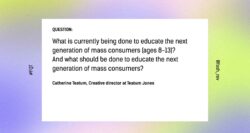
The next question by Catherine Teatum, Creative Director at Teatum Jones, focussed on educating the next generation.
Kate Fletcher, Centre for Sustainable Fashion, UAL:
The education of this group is mainly currently handled by the marketing departments of brands. And this is really shocking, isn’t it? The economic growth focus that’s so prevalent in society means that consumption really isn’t critically considered in schools and across the curriculum. There isn’t a coherent critique of what consumption practices mean in the school curriculum in the UK at all.
Dio Kurazawa, Cofounder, The Bear Scouts:
I think it’s really about coming together and working with a variety of folks who may not be embracing responsible fashion or climate change, but maybe they have the platform that prevails for that demographic. I think we need to work together across industries in order to get this message across.
Mary Creagh, Advisor on climate, sustainable development, green finance and MP 2005-19:
I think this virus is an opportunity for us to sit at home and talk about how we learn and what we learnt. And when we had our inquiry, we had a lecturer from Leeds College of Fashion who said, ‘one of my students said I’m going to have to go and get a new coat because the buttons come off this one’. The fact that you’ve got fashion students, and I’m not saying this is universal but it was anecdotal evidence, that can’t sew on a button. When 20 years earlier, you have 11 year olds that can do blanket stitch and chain stitch. Once you’ve made something and sweated over it for hours, you’re much more likely to throw it out because you actually understand the making and creation that went into it.
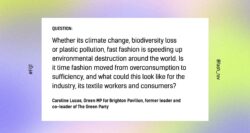
Caroline Lucas, MP for Brighton Pavillion and former leader of the Green Party, asked what a world could look like if we moved away from consumption to a model of sufficiency.
Mary Creagh, Advisor on climate, sustainable development, green finance and MP 2005-19:
How do brands in fashion 2.0 make deeper relationships? They know their staff here in this country. Why can’t they know their staff in Bangladesh, in China? And why can’t they look after them in the way that they look after their workers here? And if you go back to Salts Mill and Salter or Bournville for Cadbury’s, some of those great industrialists realised their workers were living in awful conditions and created model villages for them. I think there’s something there about knowing your workers better.
Dio Kurazawa, Cofounder, The Bear Scouts:
We just now have a new launch of a new innovation that allows you to feel the fabric of a garment just through your mobile phone. So there are a lot of innovations that are out there. The problem is fast fashion won’t pay for it because the model of the fast fashion is built on does not allow for such a thing. It’s based on spending little but having a big margin to sell in order to get a profit. And until that shifts, until you can regulate, at least the businesses within the UK who are going way over to the far East in order to take advantage of these lower prices, then we’re never really going to get anywhere.
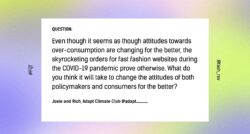
A question from Josie and Rich, Adapt Climate Club, explored how we can change attitudes of consumers and policymakers.
Kenya Hunt, Fashion Director, Grazia:
I work on the B2C side of things, so I’m always speaking to the consumer at the magazine. I think it’s about just really constantly showing them how their habits really impact one’s day to day life. I was talking to the designer Bethany Williams and she was saying that if people knew that when you order multiple sizes and you keep one and you send the others back that they may be burned, that they probably wouldn’t do it. So, I think educating them essentially to the high cost, the very high cost of cheap clothing, should be number one.
Dr Lisa Cameron MP and Chair of the APPG for Textiles and Fashion:
We need to make it more obvious for consumers, perhaps like a traffic light system of green, amber and red in relation to different aspects of manufacturing. There’s some resistance obviously from the industry itself. So, I think it’s going to be a combination of shifting our education for young people to make sure that they understand the global goals, the sustainable development goals, by combining that with some regulation.
Orsola de Castro, co-founder of Fashion Revolution closed Fashion Question Time with a speech:
We will have to look for balance after all this. Let’s ensure this period of restrictions won’t be followed by one of hyper excesses, of business as usual times 10. There are ways to make an adequate amount of products, providing dignified work to the people who make them, while protecting and conserving our environment – we have to invest in them and implement them with rigour. So the call to action from this FQT couldn’t be more simple. Go back to the event’s title: Mass consumption – the end of an era? And the remove the question mark. Mass consumption – the end of an era. FULL STOP.
We are so grateful to Baroness Lola Young of Hornsey for chairing our first *virtual* Fashion Question Time event, and to our brilliant panellists, Mary Creagh, Kenya Hunt, Dr Lisa Cameron MP, Kate Fletcher and Dio Kurazawa. In addition, we would like to thank Edwina Ehrman and the team at the V&A for their continued support despite the circumstances.

